鼓励支持民办教育政策汇编
民办高等学校办学管理若干规定(2015法信汇编版)-中华人民共和国教育部令第38号
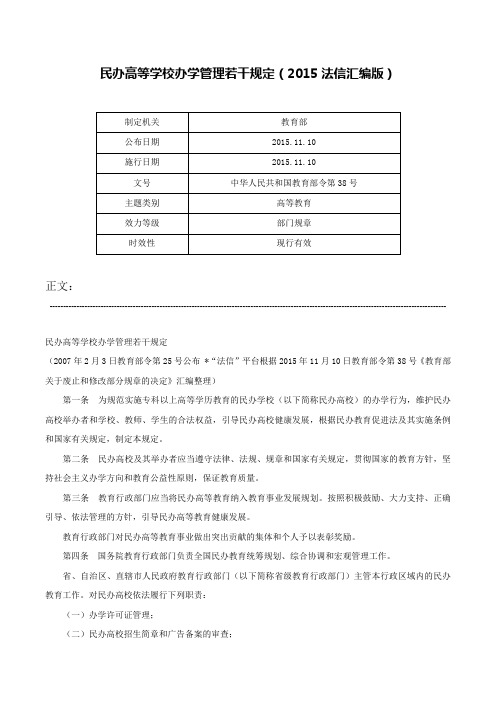
民办高等学校办学管理若干规定(2015法信汇编版)正文:----------------------------------------------------------------------------------------------------------------------------------------------------民办高等学校办学管理若干规定(2007年2月3日教育部令第25号公布 *“法信”平台根据2015年11月10日教育部令第38号《教育部关于废止和修改部分规章的决定》汇编整理)第一条为规范实施专科以上高等学历教育的民办学校(以下简称民办高校)的办学行为,维护民办高校举办者和学校、教师、学生的合法权益,引导民办高校健康发展,根据民办教育促进法及其实施条例和国家有关规定,制定本规定。
第二条民办高校及其举办者应当遵守法律、法规、规章和国家有关规定,贯彻国家的教育方针,坚持社会主义办学方向和教育公益性原则,保证教育质量。
第三条教育行政部门应当将民办高等教育纳入教育事业发展规划。
按照积极鼓励、大力支持、正确引导、依法管理的方针,引导民办高等教育健康发展。
教育行政部门对民办高等教育事业做出突出贡献的集体和个人予以表彰奖励。
第四条国务院教育行政部门负责全国民办教育统筹规划、综合协调和宏观管理工作。
省、自治区、直辖市人民政府教育行政部门(以下简称省级教育行政部门)主管本行政区域内的民办教育工作。
对民办高校依法履行下列职责:(一)办学许可证管理;(二)民办高校招生简章和广告备案的审查;(三)民办高校相关信息的发布;(四)民办高校的年度检查;(五)民办高校的表彰奖励;(六)民办高校违法违规行为的查处;(七)法律法规规定的其他职责。
第五条民办高校的办学条件必须符合国家规定的设置标准和普通高等学校基本办学条件指标的要求。
民办高校设置本、专科专业,按照国家有关规定执行。
第六条民办高校的举办者应当按照民办教育促进法及其实施条例的规定,按时、足额履行出资义务。
私立学校补贴制度

随着我国教育体制的改革和多元化发展,私立学校在我国教育领域发挥着越来越重要的作用。
为了鼓励和支持私立学校的发展,国家制定了一系列补贴政策,旨在减轻私立学校的办学负担,提高教育质量,促进教育公平。
以下是对我国私立学校补贴制度的简要介绍。
一、补贴政策概述1. 税收优惠政策根据《中华人民共和国民办教育促进法》第四十七条,非营利性民办学校享受与公办学校同等的税收优惠政策。
此外,民办学校还可以接受公民、法人或其他组织的捐赠,并对捐赠者给予税收优惠。
2. 专项资金扶持《民办教育促进法》第四十四条规定,县级以上各级人民政府可以设立专项资金,用于资助民办学校的发展,奖励和表彰有突出贡献的集体和个人。
这些资金主要用于改善学校基础设施、提高教师待遇、开展教育教学改革等方面。
3. 政府购买服务《民办教育促进法》第四十六条规定,县级以上各级人民政府可以采取购买服务、助学贷款、奖助学金和出租、转让闲置的国有资产等措施对民办学校予以扶持。
政府购买服务主要是指政府将某些教育服务项目委托给民办学校,以减轻公办学校的负担。
4. 信贷支持《民办教育促进法》第四十九条规定,国家鼓励金融机构运用信贷手段,支持民办教育事业的发展。
金融机构可以为民办学校提供贷款、担保等服务,帮助学校解决资金难题。
二、补贴政策实施1. 补贴对象补贴对象主要包括民办学校、民办幼儿园、民办职业教育机构等。
符合条件的民办学校可以根据实际情况申请相应的补贴。
2. 补贴标准补贴标准根据不同地区、不同类型学校及不同项目而有所不同。
例如,深圳市对义务教育阶段的民办学校学生提供学位补贴,小学不超过每人每年5000元,初中不超过每人每年6000元。
3. 补贴申请流程民办学校申请补贴,需按照当地教育行政部门的规定,提交相关材料,如学校资质证明、财务报表、项目申报书等。
教育行政部门将对申请材料进行审核,符合条件的学校将获得补贴。
三、补贴政策效果1. 提高民办学校办学质量补贴政策的实施,有助于民办学校改善办学条件,提高教师待遇,从而提高教育质量。
湖北省人民政府关于进一步促进民办普通高等教育发展的若干意见-鄂政发[2013]61号
![湖北省人民政府关于进一步促进民办普通高等教育发展的若干意见-鄂政发[2013]61号](https://img.taocdn.com/s3/m/f744bf275627a5e9856a561252d380eb62942370.png)
湖北省人民政府关于进一步促进民办普通高等教育发展的若干意见正文:---------------------------------------------------------------------------------------------------------------------------------------------------- 湖北省人民政府关于进一步促进民办普通高等教育发展的若干意见(鄂政发[2013]61号)各市、州、县人民政府,省政府各部门:民办普通高等教育是社会公益性事业,是我省高等教育的重要组成部分和新的增长点。
为贯彻落实《中共中央关于全面深化改革若干重大问题的决定》,促进全省民办普通高等教育持续健康发展,依据《中华人民共和国民办教育促进法》及其实施条例等法律法规、行政规章和《湖北省中长期教育改革和发展规划纲要(2011-2020年)》有关精神,提出以下意见。
一、扩大办学自主权(一)扩大招生自主权。
年度增量招生计划向办学条件优良、高质量、有特色的民办普通高校倾斜。
办学规范、条件优良、管理严格的民办普通高校,可根据国家有关规定和核定的办学规模自主确定年度分专业招生计划和跨省招生计划,报省教育、发展改革部门审核备案后,面向社会公布招生。
支持民办普通高校根据学校实际确定专业招生批次。
支持民办普通本科高校开展普通“专升本”及自主招生改革试点,支持民办高职学校开展高职招生考试改革试点。
(二)扩大专业设置自主权。
鼓励不同类型、不同层次的民办普通高校科学定位、错位发展、办出特色。
支持民办普通高校根据经济社会发展对人才的需求和学校办学特色定位,建立学科专业动态调整机制。
除国家控制的专业外,民办普通高校按照教育部专业设置管理的有关规定,自主设置和调整本、专科专业。
(三)推进办学体制机制创新。
支持民办普通高校开展试点学院改革。
鼓励民办普通高校推进学分制改革,探索适合学校特点、有利于创新人才培养的教学管理制度。
湖州市人民政府关于促进民办教育健康发展的实施意见

湖州市人民政府关于促进民办教育健康发展的实施意见文章属性•【制定机关】湖州市人民政府•【公布日期】2015.03.18•【字号】湖政发〔2015〕9号•【施行日期】2015.03.18•【效力等级】地方规范性文件•【时效性】失效•【主题分类】民办教育正文湖州市人民政府关于促进民办教育健康发展的实施意见湖政发〔2015〕9号各县区人民政府,市府各部门,市直各单位:为鼓励和引导社会资本进入我市教育领域,加快形成公办民办互补、有序竞争和良性发展的多元办学格局,构建政府主导、社会参与、办学主体多元、办学形式多样的教育体系,不断满足人民群众多样化的教育需求,加快推进我市教育现代化进程,根据《浙江省人民政府关于促进民办教育健康发展的意见》(浙政发〔2013〕47号)精神,结合我市实际,提出如下实施意见:一、深化办学体制改革,明确民办学校责任权益(一)实施分类登记管理。
对民办学校按照非营利性和营利性进行分类登记管理。
民办学校可以按规定自主选择登记为非营利性或营利性法人。
具有国有资产成份的非营利性民办学校,可按事业法人进行登记管理,其他非营利性民办学校由民政部门按照民办非企业法人进行登记管理;营利性民办学校由市场监督管理部门按照企业法人进行登记管理。
法人属性一经确定,一般不予变更。
国有资产投资、参与举办民办学校的,须经同级财政或国资部门审批,并由出资者履行相应职能;国有资产已投入但未办理审批手续的,要办理报批手续。
(二)明确法人财产权利。
民办学校举办者须按规定将应出资资金足额投入学校,并经有关部门验资确认。
民办学校各类投资、捐资、办学积累等形成的土地、房屋、设备等资产,产权均须办到学校名下;资产尚未过户的,按账面原值6个月内办结过户。
除捐资举办的民办学校外,其他民办学校出资或投资者拥有其实际出资额的财产所有权,对其出资权益可以增设、释股、转让、继承、赠与,但学校存续期间不得抽回资金。
捐资举办的非营利性学校,所有净资产归社会所有,终止办学后,由学校审批部门负责统筹,继续用于教育事业;其余非营利性学校,出资人拥有实际出资额(含学校存续期间追加投资额)财产所有权。
郑州市人民政府关于进一步扶持民办教育发展的若干意见-郑政[2011]83号
![郑州市人民政府关于进一步扶持民办教育发展的若干意见-郑政[2011]83号](https://img.taocdn.com/s3/m/7176637d26d3240c844769eae009581b6bd9bd4d.png)
郑州市人民政府关于进一步扶持民办教育发展的若干意见正文:---------------------------------------------------------------------------------------------------------------------------------------------------- 郑州市人民政府关于进一步扶持民办教育发展的若干意见(郑政〔2011〕83号)各县(市、区)人民政府,市人民政府各部门,各有关单位:为适应我市经济社会战略发展的需要,进一步促进我市民办教育健康持续发展,满足人民群众对教育的多样化需求,为郑州都市区建设做出新的更大的贡献,根据《中华人民共和国民办教育促进法》及其实施条例,结合我市实际,现就进一步加大对民办教育的扶持力度提出如下意见,请认真贯彻执行。
一、民办教育事业属于公益性事业,民办学校与公办学校具有同等的法律地位,民办学校的教师与公办学校教师享有同等的法律地位。
二、对来郑投资办学,小学新增24个教学班,初中、高中段教育学校新增36个教学班,达到国家建校标准的,给予民办学校奖励,用于教育教学设施的购置。
学校建成后,小学每个教学班给予20万元奖励,初中每个教学班给予30万元奖励,高中段教育学校每个教学班给予50万元奖励。
市区高中及全市中等专业学校的奖励,由市财政按照经有关部门审定的项目给予学校一次性奖励;市区小学、初中的奖励,按照经有关部门审定的项目由市、区财政各承担50%奖励费用给予学校一次性奖励;县(市)、上街区中小学的奖励,由县(市)、上街区财政按照经有关部门审定的项目给予学校一次性奖励。
三、新建、扩建民办学校用地属非营利性教育设施用地的,按照用地政策规定享受与公办学校同等的优惠政策。
民办学校的校舍建设享受同级同类公办学校的基本建设优惠政策。
四、投资举办的民办学校和出资人不要求取得合理回报的民办学校,依法享受与公办学校同等的税收及其他优惠政策。
2024年民办教育促进法实施条(二篇)
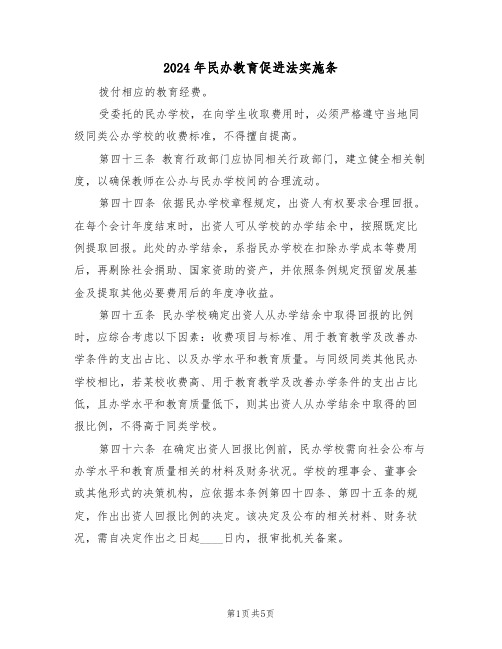
2024年民办教育促进法实施条拨付相应的教育经费。
受委托的民办学校,在向学生收取费用时,必须严格遵守当地同级同类公办学校的收费标准,不得擅自提高。
第四十三条教育行政部门应协同相关行政部门,建立健全相关制度,以确保教师在公办与民办学校间的合理流动。
第四十四条依据民办学校章程规定,出资人有权要求合理回报。
在每个会计年度结束时,出资人可从学校的办学结余中,按照既定比例提取回报。
此处的办学结余,系指民办学校在扣除办学成本等费用后,再剔除社会捐助、国家资助的资产,并依照条例规定预留发展基金及提取其他必要费用后的年度净收益。
第四十五条民办学校确定出资人从办学结余中取得回报的比例时,应综合考虑以下因素:收费项目与标准、用于教育教学及改善办学条件的支出占比、以及办学水平和教育质量。
与同级同类其他民办学校相比,若某校收费高、用于教育教学及改善办学条件的支出占比低,且办学水平和教育质量低下,则其出资人从办学结余中取得的回报比例,不得高于同类学校。
第四十六条在确定出资人回报比例前,民办学校需向社会公布与办学水平和教育质量相关的材料及财务状况。
学校的理事会、董事会或其他形式的决策机构,应依据本条例第四十四条、第四十五条的规定,作出出资人回报比例的决定。
该决定及公布的相关材料、财务状况,需自决定作出之日起____日内,报审批机关备案。
第四十七条民办学校若存在以下情形之一,出资人将不得取得回报:发布虚假招生信息骗取钱财;擅自增加收费项目或提高收费标准且情节严重;非法颁发或伪造学历、职业资格证书;骗取或伪造、变造、买卖、出租、出借办学许可证;财务管理混乱,违反会计法及国家会计制度;违反税收征管法律法规受到税务机关处罚;校舍或教学设施存在重大安全隐患且未及时采取措施导致重大事故;教育教学质量低下造成恶劣社会影响;出资人抽逃资金或挪用办学经费。
第四十八条除民办教育促进法及本条例规定的扶持与奖励措施外,省、自治区、直辖市人民政府可根据实际情况,制定本地区促进民办教育发展的相关政策。
2023民办教育促进法实施条例

2023民办教育促进法实施条例第一章总则第一条为贯彻落实《中华人民共和国教育法》和《教育规划纲要》等法律法规,加强对民办教育的监督和管理,保障民办教育的合法权益,促进教育事业的发展,制定本条例。
第二条本条例适用于民办幼儿园、小学、初中、高中、中等职业学校、大学、研究生院和成人教育等各类教育机构的管理。
第三条国家鼓励社会力量兴办教育事业,支持民办教育发展,推动民办教育与公办教育协调发展,满足人民对教育的多样需求。
第四条民办教育机构必须符合国家教育规划纲要和有关法律法规的要求,按照有关规定申请设立并经批准后方可开展教育活动。
第二章设立和变更第五条民办教育机构应当按照国家有关规定选择合适的经营地点,向所在地教育行政部门提出设立申请,并提供设立机构的名称、教育层次、办学规模、建设条件、经费来源等相关材料。
第六条教育行政部门应当依法审查设立申请,对符合条件的,应当及时发给《民办教育机构批准证书》;对不符合条件的,应当书面告知不符合原因。
第七条民办教育机构变更其名称、教育层次、办学规模、经营地点等重要事项的,应当向所在地教育行政部门提出变更申请,并提供相关材料。
教育行政部门应当依法审查变更申请,对符合条件的,发给《民办教育机构变更证书》。
第八条民办教育机构发起或者变更的股权和合伙人份额,应当符合法律、行政法规规定的条件,经有关主管部门审核批准后方可实施。
第三章教育质量和管理第九条民办教育机构应当建立健全教育质量监测评估制度,定期对教学、管理等方面进行评估,并向社会公开评估结果。
第十条民办教育机构应当按照国家有关要求招聘具有相应教育教学资格的教职工,保障教职工的合法权益。
第十一条民办教育机构应当依法履行政府投资项目管理、资金管理、税收优惠等方面的义务。
第十二条民办教育机构应当建立学生管理制度,确保学生的安全和健康,保障学生的合法权益。
第四章监督和检查第十三条教育行政部门应当加强对民办教育机构的监督和管理,对民办教育机构的设立和变更进行审查和备案,并依法对违法违规行为进行查处。
民办教育政策法规汇编

民办教育政策法规汇编岳阳市教育局二〇一〇年八月序言刘志高30年,对于上下五千年文明史的中国来说,无异于沧海一粟;30年,对于中国民办教育而言,却是谱写了一曲跨越式发展的华丽篇章。
30年艰苦奋斗,30年筚路蓝缕,我国民办教育已经形成了从学前教育到高等教育完整的体系,对扩大教育资源,满足社会多元化教育需求,推进教育体制改革和机制创新等发挥了重要作用,成为我国社会主义教育体系中不可或缺的组成部分。
今天,民办教育在转型发展的进程中面临着前所未有的机遇和一系列亟待解决的问题。
其中,如何依法依规办学,进一步树立民办教育良好的社会形象,如何用法律手段维护自身的合法权益,进一步拓展宽松有序的办学环境,是政府部门,社会各界,尤其是广大民办教育工作者应高度重视并认真践行的。
岳阳市社会力量办学协会组织专门力量编印了这本《民办教育政策法规汇编》,书中收录了国家民办教育法律法规、省市地方性法规以及配套文件,是一部民办教育管理人士必备的常用法律、法规及政策书籍,编印成册旨在供民办教育工作者有关法界人士参考借鉴。
法律法规其实也就是社会约定俗成的行为尺度,依规办学是我们办学者应尽的职责,依法维权也正是法律赋予我们的权利。
希望广大民办教育工作者知法、守法,且善于运用法律的利器为各自的学校,为整个民办教育事业铺平前行的道路。
(作者系岳阳市教育局党组成员、副局长)二〇一〇年八月目录一、国家中长期教育改革和发展规划纲要(2010-2020年)二、民办教育法律法规1、中华人民共和国民办教育促进法(2002年12月)2、中华人民共和国民办教育促进法实施条例(2004年3月)3、民办非企业单位登记管理暂行条例(1998年10月)4、民办非企业单位名称管理暂行规定(1999年12月)5、教育类民办非企业单位登记办法(试行)(2001年10月)6、中华人民共和国劳动合同法(2007年6月)7、校园安全事故处理办法(2002年9月1日)8、中小学幼儿园安全管理办法(2006年6月)三、地方法规及配套文件1、湖南省实施《中华人民共和国民办教育促进法》办法(2007年3月)2、湖南省中小学校学生人身伤害事故预防与处理条例(2005年1月)3、湖南省人民政府关于促进民办教育发展的决定(2008年1月)4、湖南省教育厅印发《关于进一步规范普通中小学办学行为的规定》的通知(2009年7月)5、岳阳市人民政府关于促进民办教育发展的意见(2008年2月)6、岳阳市教育局关于选派公办教师到民办学校支教的意见(2008年9月)7、岳阳市教育局关于印发《岳阳市民办学校教师队伍管理暂行规定》的通知(2009年7月)8、岳阳市教育局关于印发《岳阳市民办非学历教育培训机构设立审批暂行规定》的通知(2010年7月)9、岳阳市教育局关于加强民办短期培训学校培训点设置管理工作的通知(2010年2月)10、岳阳市教育局关于严禁中小学在职教师有偿家教家养和学校(教育机构)违规办班补课的通知》(2010年3月)国家中长期教育改革和发展规划纲要(2010-2020年)根据党的十七大关于“优先发展教育,建设人力资源强国”的战略部署,为促进教育事业科学发展,全面提高国民素质,加快社会主义现代化进程,制定本《教育规划纲要》。
济南市人民政府关于鼓励和促进民办教育优质发展的意见-济政发〔2019〕4号
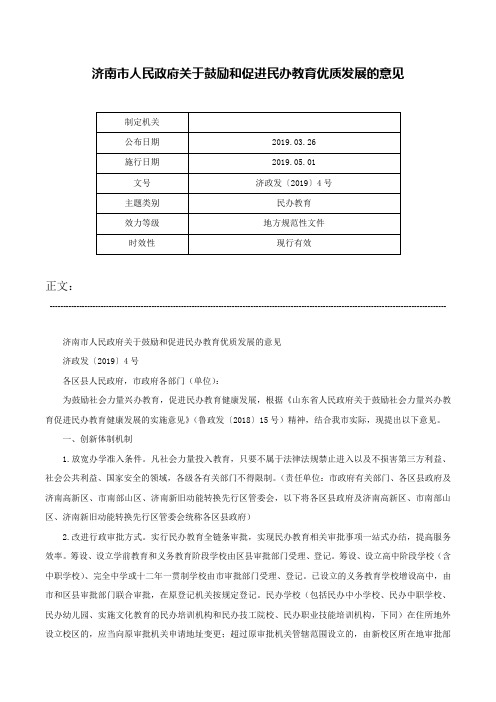
济南市人民政府关于鼓励和促进民办教育优质发展的意见正文:----------------------------------------------------------------------------------------------------------------------------------------------------济南市人民政府关于鼓励和促进民办教育优质发展的意见济政发〔2019〕4号各区县人民政府,市政府各部门(单位):为鼓励社会力量兴办教育,促进民办教育健康发展,根据《山东省人民政府关于鼓励社会力量兴办教育促进民办教育健康发展的实施意见》(鲁政发〔2018〕15号)精神,结合我市实际,现提出以下意见。
一、创新体制机制1.放宽办学准入条件。
凡社会力量投入教育,只要不属于法律法规禁止进入以及不损害第三方利益、社会公共利益、国家安全的领域,各级各有关部门不得限制。
(责任单位:市政府有关部门、各区县政府及济南高新区、市南部山区、济南新旧动能转换先行区管委会,以下将各区县政府及济南高新区、市南部山区、济南新旧动能转换先行区管委会统称各区县政府)2.改进行政审批方式。
实行民办教育全链条审批,实现民办教育相关审批事项一站式办结,提高服务效率。
筹设、设立学前教育和义务教育阶段学校由区县审批部门受理、登记。
筹设、设立高中阶段学校(含中职学校)、完全中学或十二年一贯制学校由市审批部门受理、登记。
已设立的义务教育学校增设高中,由市和区县审批部门联合审批,在原登记机关按规定登记。
民办学校(包括民办中小学校、民办中职学校、民办幼儿园、实施文化教育的民办培训机构和民办技工院校、民办职业技能培训机构,下同)在住所地外设立校区的,应当向原审批机关申请地址变更;超过原审批机关管辖范围设立的,由新校区所在地审批部门受理、登记。
完全中学或十二年一贯制学校拆分,根据办学层次重新审批办学许可并登记。
民办教育法规用地优惠政策

中华人民共和国民办教育促进法第三条民办教育事业属于公益性事业,是社会主义教育事业的组成部分。
国家对民办教育实行积极鼓励、大力支持、正确引导、依法管理的方针。
各级人民政府应当将民办教育事业纳入国民经济和社会发展规划。
第五条民办学校与公办学校具有同等的法律地位,国家保障民办学校的办学自主权。
国家保障民办学校举办者、校长、教职工和受教育者的合法权益。
第六条国家鼓励捐资办学。
国家对为发展民办教育事业做出突出贡献的组织和个人,给予奖励和表彰。
第四十四条县级以上各级人民政府可以设立专项资金,用于资助民办学校的发展,奖励和表彰有突出贡献的集体和个人。
第四十五条县级以上各级人民政府可以采取经费资助,出租、转让闲置的国有资产等措施对民办学校予以扶持。
第四十六条民办学校享受国家规定的税收优惠政策。
第五十条新建、扩建民办学校,人民政府应当按照公益事业用地及建设的有关规定给予优惠。
教育用地不得用于其他用途。
第五十二条国家采取措施,支持和鼓励社会组织和个人到少数民族地区、边远贫困地区举办民办学校,发展教育事业。
中华人民共和国民办教育促进法实施条例第六章扶持与奖励第三十八条捐资举办的民办学校和出资人不要求取得合理回报的民办学校,依法享受与公办学校同等的税收及其他优惠政策。
四川省《中华人民共和国民办教育促进法》实施办法第四条民办学校与公办学校具有同等的法律地位。
民办学校的办学自主权及其他合法权益受法律保障。
第二十六条县级以上地方各级人民政府应当设立专项资金,用于资助民办教育事业的发展,奖励和表彰有突出贡献的集体和个人。
第二十七条国有企事业单位可以将闲置的房产和设备设施等资源以国有资产投入形式与民办学校合作办学或依法优先出租、转让给民办学校使用。
第二十八条捐资举办的民办学校和出资人不要求取得合理回报的民办学校,依法享受与公办学校同等的税收以及其他优惠政策。
第三十一条民办学校在水、电、气等公用事业性收费方面,执行与同类公办学校同等的价格政策。
民办教育促进法汇编正规版

民办教育促进法汇编(可以直接使用,可编辑优秀版资料,欢迎下载)Law of the People's Republic of China on the Promotionof Privately-run Schools(Adopted at the 31st Meeting of the Standing Committee of the Ninth National People's Congress on December 28, 2002 and promulgated by Order No. 80 of the President of the People's Republic of China on December 28, 2002)ContentsChapter I General ProvisionsChapter II EstablishmentChapter III Organization and Activities of SchoolsChapter IV Teachers and EducateesChapter V School Assets and Financial ManagementChapter VI Administration and SupervisionChapter VII Support and RewardChapter VIII Alteration and TerminationChapter IX Legal ResponsibilityChapter X Supplementary ProvisionsChapter IGeneral ProvisionsArticle 1 This Law is enacted in accordance with the Constitution and the Education Law with a view to implementing the strategy of invigorating the country through science, technology and education, promoting the sound development of privately-run schools, and safeguarding the lawful rights and interests of the privately-run schools and the educatees.Article 2 This Law shall be applicable to activities conducted by public organizations or individuals, other than State organs, to establish and run schools and other institutions of education with non-governmental financial funds, which are geared to the need of society. In cases to which no provisions of this Law are applicable, the provisions in the Education Law and other laws concerning education shall apply.Article 3 Privately-run schools belong to public welfare undertakings and constitute a component part of the cause of socialist education.With regard to privately-run schools, the State applies the principles of enthusiastic encouragement, vigorous support, correct guidance, and administration according to law.People's governments at all levels shall incorporate the undertakings of the privately-run schools into their plans of national economic and social development.Article 4 Privately-run policy schools shall abide by laws and regulations, implement the education of the State, guarantee the educational quality and devote their efforts to the training of various types of people for the cause of socialist development.Privately-run schools shall implement the principle of separating education from religion. No organizations or individuals may make use of religion to conduct activities designed to interfere with the educational system of the State.Article 5 Privately-run schools and government-run schools shall share equal legal status, and the State safeguards the autonomy of the privately-run schools.The State protects the lawful rights and interests of thesponsors, principals, teachers and staff members and educatees of privately-run schools.Article 6 The State encourages donations made for establishing and running schools.The State rewards and commends organizations and individuals that have made outstanding contributions to the development of the undertakings of privately-run schools.Article 7 The administrative department for education under the State Council shall be in charge of the overall planning, comprehensive coordination and macro-administration of the work relating to privately-run schools nationwide.The administrative department for labor and social security and the relevant departments under the State Council shall respectively be in charge of the work relating to the privately-run schools within the scope of their duties as defined by the State Council.Article 8 The administrative departments for education under the local people's governments at or above the county level shall be responsible for the workrelating to privately-run schools in their own administrative regions.The administrative departments for labor and social security and the relevant departments under the local people's governments at or above the county level shall respectively be responsible for the work relating to privately-run schools within the scope of their duties.Chapter IIEstablishmentArticle 9 Public organizations that establish privately-run schools shall possess the qualifications of a legal person.Individuals that establish privately-run schools shall possess political rights and full capacity for civil conduct.A privately-run school shall have the qualifications of a legal person.Article 10 The establishment of a privately-run school shall meet the local need for educational development and the requirements provided for by the education Law and relevant laws and regulations.The standards for the establishment of privately-run schools shall, mutatis mutandis, conform to those for the establishment of government-run schools of the same grade and category.Article 11 The establishment of privately-run schools that provide education for academic credentials, pre-school education, training for preparing self-study examinations and other cultural education shall be subject to examination and approval by the administrative departments for education under the people's governments at or above the county level within the limits of their powers defined by the State; the establishment of a privately-run school that mainly provides training for vocational skills, including training for vocational qualification, shall be subject to examination and approval by the administrative department for labor and social security under the people's government at or above the county level within the limits of its powers defined by the State, which shall send a duplicate of the approval document to the administrative department for education at the same level for the record.Article 12 To apply for preparing to establish a privately-run school, the sponsor shall submit to theexamination and approval authority the following materials:(1) an application, the contents of which mainly include: the sponsor, the aims of education, size of the student body, level of the school, forms of education, conditions for establishing and running the school, internal management system, raising of funds and their management and use, etc.;(2) name of the sponsors and their addresses or the title of the sponsor and its address;(3) source of the assets, amount of the funds and their effective certificates, in which the property rights are clearly stated; and(4) where the assets of the school are donated, an agreement on the donations, in which the names of the donators, the amount of the assets donated, their use and management, and the relevant effective certificates are clearly stated.Article 13 The examination and approval authority shall, within 30 days from the date it receives the application for preparing to establish a privately-run school, make adecision in writing on whether to approve it or not.If it approves the application, it shall issue a written approval for preparing to establish the school; and if it does not approve the application, it shall explain the reasons.The period of preparation for establishment of such a school shall not exceed three years; and if it exceeds three years, the sponsor shall renew its application.Article 14 To apply for official establishment of a privately-run school, the sponsor shall submit the following materials to the examination and approval authority:(1) the written approval for preparing to establish the school;(2) a report on the preparations made for the establishment;(3) articles of association of the school and the name lists of the component members of the first executive council, board of directors or other decision-making bodies of the school;(4) effective certificates of the assets of the school; and(5) qualification certificates of the principal, teachers, and book-keepers and accountants.Article 15 Where conditions for the establishment of a school are satisfied and the standards for establishment are reached, an application may directly be made for its official establishment, and the materials specified in Article 12 and subparagraphs (3), (4) and (5) of Article 14 of this Law shall be submitted.Article 16 Where an application for official establishment of a privately-run school is made, the examination and approval authority shall, within three months from the date it receives the application, make a decision in writing on whether to approve it or not, and sere the decision on the applicant; and where, in this regard, an application is made for the official establishment of a privately-run institution of higher education, the examination and approval authority may, within six months from the date it receives the application, likewise make a decision in writing on whether to approve it or not and serve the decision on the applicant.Article 17 The examination and approval authorityshall issue a license for establishment of a school to the privately-run school for the official establishment of which it gives approval.Where the examination and approval authority does not approve the official establishment of a school, it shall explain the reasons.Article 18 Where a privately-run school obtains the license for establishment and, in accordance with the provisions of relevant laws and administrative regulations, registers with the registration authority, the latter shall immediately handle the matter in accordance with relevant regulations.Chapter IIIOrganizations and Activities of SchoolsArticle 19 A privately-run school shall set up an executive council, a board of directors or other forms of decision-making bodies of the school.Article 20 The executive council or the board of directors of the school shall be composed of the sponsors or their representatives, the principal, and the representatives of the teachers and staff members. Morethan one-third of the council members or directors shall, at least, have five years' education or teaching experience each.The executive council or the board of directors of the school shall be composed of not less than five persons, with one of them serving as chairman of the council or board. The name list of the chairman and members of the council or the chairman of the board and directors shall be submitted to the examination and approval authority for the record.Article 21 The executive council or the board of directors of a school shall exercise the following functions and powers:(1) to appoint and dismiss the principal;(2) to amend the articles of association of the school and formulate rules and regulations of the school;(3) to make development plans and approve annual work plans;(4) to raise funds for running the school, and examine and verify the budgets and final accounts;(5) to decide on the size and the wage standards of the teachers and staff members;(6) to decide on the division, merging and termination of the school; and(7) to decide on other important matters.The functions and powers of other forms of decision-making bodies shall be defined in reference to the provisions of this Article.Article 22 The chairman of the executive council or the board of directors or the principal of a privately-run school shall serve as the legal representative of the school.Article 23 A privately-run school shall, in reference to the qualifications for the principal of a government-run school of the same grade and category, appoint its principal, and the age limit may appropriately be extended both ways, and the appointment shall be reported to the examination and approval authority for verification and approval.Article 24 The principal of a privately-run school shall be in charge of education, teaching and administration of the school, and exercise the following functions andpowers:(1) to carry out the decisions made by the executive council, board of directors or any other form of decision-making body;(2) to put into execution the development plans, draw up the annual work plans and financial budgets, and formulate the rules and regulations of the school;(3) to appoint and dismiss staff members of the school, and give rewards and impose punishments;(4) to make arrangements for education, teaching and scientific research, and ensure the quality of education and teaching;(5) to be responsible for the daily work of school administration; and(6) other powers delegated by the executive council, the board of directors or any other form of decision-making body of the school.Article 25 A privately-run school may, on the basis of their classifications, the length of schooling and their academic performance and in accordance with therelevant regulations of the State, issue academic credentials, certificates for completing a course or qualification certificates of training to the students it enrolled.Students who receive training in vocational skills may be awarded vocational qualification certificates of the State when they are considered qualified by the vocational skills appraisal authority approved by the State.Article 26 A privately-run school shall, in accordance with law, ensure that the teachers and staff members participate in democratic management and supervision through the representative assembly of the teachers and staff members with the teachers as the main body, or through other forms.Teachers and staff members of a privately-run school shall, in accordance with the Trade Union Law, have the right to form trade union organizations to protect their lawful rights and interests.Chapter IVTeachers and EducateesArticle 27 Teachers and educatees of privately-runschools shall enjoy equal legal status as the teachers and educatees of government-run schools shall.Article 28 Teachers appointed by privately-run schools shall possess the qualifications for teaching specified by the State.Article 29 Privately-run schools shall conduct ideological and moral education and professional training among teachers.Article 30 Privately-run schools shall guarantee the wages and welfare benefits for teachers and staff members according to law, and pay social insurance premiums for them.Article 31 The teachers and staff members of privately-run schools shall, in accordance with law, share equal rights with those of government-run schools in respect of professional training, appointment of posts, calculation of the length of service as a teacher or staff member, commendation and reward, and social activities.Article 32 Privately-run schools shall, in accordance with law, safeguard the lawful rights and interests of educatees.Privately-run schools shall, in accordance with the regulations of the State, establish the system for administration of students' records and give rewards and sanctions to educatees.Article 33 Educatees of privately-run schools shall enjoy equal rights as those of government-run schools of the same grade and category in respect of admission into schools of a higher grade, employment, preferential treatment and being elected as advanced students.Chapter VSchool Assets and Financial ManagementArticle 34 Privately-run schools shall, in accordance with law, establish financial and accounting systems and assets management system, and keep account books in accordance with the relevant regulations of the State.Article 35 Privately-run schools shall enjoy property rights of the legal persons in respect of the assets provided by sponsors to privately-run schools, State-owned assets, donated property and school accumulation.Article 36 During the period of existence ofprivately-run schools, all the assets shall, in accordance with law, be managed and used by the schools, and no organization or individual may take illegal possession of them.No organization or individuals may, in violation of laws or regulations, collect any fees from privately-run institutions of education.Article 37 The items and rates of fees to be collected by privately-run schools from educatees who receive education from academic credentials shall be worked out by the schools, submitted to relevant departments for approval and made public; and the items and rates of fees to be collected from other educatees shall be worked out by the schools concerned, submitted to relevant departments for the record and made public.The fees collected by privately-run schools shall be used mainly for educational and teaching activities and the improvement of schools conditions.Article 38 The use and the financial management of the assets for privately-run schools shall be subject to supervision by the examination and approval authority and relevant departments.Privately-run schools shall prepare their financial and accounting statements towards the end of each fiscal year, entrust public accounting firms to audit the statements according to law, and publish the audit results.Chapter VIAdministration and SupervisionArticle 39 Administrative Departments for education and the relevant departments shall provide guidance to privately-run schools in respect of education and teaching and training among teachers.Article 40 Administrative departments for education and the relevant departments shall, in accordance with law, exercise supervision over and provide guidance to privately-run schools, in order to promote the enhancement of the quality of such schools; and they shall make arrangements or entrust public intermediary bodies with the arrangements for assessing the level and the quality of education of such schools, and make the results of the assessment known to the general public.Article 41 The general regulations and advertisements for student enrollment of privately-runschools shall be submitted to the examination and approval authority for the record.Article 42 Where a privately-run school infringes upon the lawful rights and interests of educatees, the educatees and their relatives shall have the right to make petition to the administrative department for education and any relevant department, and the said department shall handle it without delay.Article 43 The State supports and encourages public intermediary bodies to provide services to privately-run schools.Chapter VIISupport and RewardArticle 44 People's governments at or above the county level may set up special funds for financing the development of privately-run schools and for rewarding and commending the collectives and individuals that have made outstanding contributions.Article 45 People's governments at or above the county level may take such measures as financial aid and the lease or transfer of idle State-owned assets in support ofprivately-run schools.Article 46 Privately-run schools shall enjoy preferential taxation policy formulated by the State.Article 47 Civilian-run schools may, in accordance with the relevant laws and regulations of the State, accept donations afforded by citizens, legal persons or other organizations.The State, in accordance with relevant regulations, applies preferential taxation policy to citizens, legal persons or other organizations that donate property to privately-run schools, and bestows commendations on them.Article 48 The State encourages financial institutions to support the development of privately-run schools by means of credit.Article 49 Where a people's government entrusts a privately-run school with the task of compulsory education, it shall, in accordance with the agreement of entrustment, appropriate the necessary amount of funds for education.Article 50 Where a privately-run school is constructedor expanded, the people's government concerned shall give it preferential treatment in accordance with the regulations on the use of land for, and the construction of, public welfare undertakings. No land to be used for education may be used for other purposes.Article 51 After the cost of a privately-run school is deducted, the funds for its development are withheld and the sum of money for other necessary expenses is drawn in accordance with the relevant regulations of the State, the fund providers may obtain a reasonable amount of requital from the cash surplus of the school. Specific measures for obtaining reasonable amounts of requital shall be formulated by the State Council.Article 52 The State takes measures to support and encourage public organizations and individuals to establish and run privately-run schools for the development of education in minority nationality areas and in out-lying and poverty-stricken areas.Chapter VIIIAlteration and TerminationArticle 53 The executive council or the board ofdirectors of a privately-run school to be divided or merged into other schools shall, after financial settlement, apply to the examination and approval authority for approval.Where a privately-run school applies for division or merging, the examination and approval authority shall, within three months form the date it receives the application, give a reply in writing; and where the application is made for the division or merging of a privately-run institution of higher education, the examination and approval authority may, within six months from the date it receives the application, likewise give a reply in writing.Article 54 For alteration of the sponsor of a privately-run school, the matter shall be put forth by the sponsor and, after financial settlement and upon agreement by the executive council or the board of directors of the school, submitted to the examination and approval authority for verification and approval.Article 55 For alteration of the name, level, or category of a privately-run school, the matter shall be submitted by the executive council or the board ofdirectors of the school to the examination and approval authority for approval.Where an application is made for the alteration of a privately-run school from one type to another, the examination and approval authority shall, within three months from the date it receives the application, give a reply in writing; and where the application is made for alteration to a privately-run institution of higher education, the examination and approval authority may, within six months from the date it receives the application, likewise give a reply in writing.Article 56 Where a privately-run school is found in one of the following circumstances, it shall be terminated:(1) it is required to be terminated according to the provisions of the articles of association of the school, and the termination is approved by the examination and approval authority;(2) the license for running the school is revoked; or(3) it cannot continue due to insolvency.Article 57 When a privately-run school is to be terminated, it shall make proper arrangements for thestudents in school. When a privately-run school providing compulsory education is to be terminated, the examination and approval authority shall assist the school to make arrangements for the students to continue their studies.Article 58 When a privately-run school is to be terminated, it shall make financial settlement according to law.Where a privately-run school requests termination itself, it shall make arrangements for the settlement; where it is abolished by the examination and approval authority according to law, the settlement shall be arranged by the authority; and where it is terminated because it cannot continue due to insolvency, the settlement shall be arranged by the People's Court.Article 59 Property of a privately-run school shall be liquidated in the following order:(1) tuition fees and extras and other expenses paid by educatees that should be returned;(2) wages payable to the teachers and staff members and the social insurance premiums that should be paid;and(3) other debts that should be cleared off.The remaining property of a privately-run school after the debts mentioned above are cleared off shall be disposed of in accordance with the provisions of relevant laws and administrative regulations.Article 60 When a privately-run school is terminated, the license for running the school shall be taken back, its seals destroyed and its registration cancelled by the examination and approval authority.Chapter IXLegal ResponsibilityArticle 61 Where, in conducting education activities, a privately-run school violates the provisions of the Education Law or the Teachers Law, it shall be punished in accordance with the relevant provisions of the Education Law or the Teachers Law.Article 62 Where a privately-run school commits one of the following acts, the examination and approval authority or the relevant department shall order it torectify within a time limit and give it a disciplinary warning; if there are unlawful gains derived therefrom, they shall be confiscated after returning the fees collected; if the circumstances are serious, it shall be ordered to stop enrolling students and its license for running the school shall be revoked; and if a crime is constituted, it shall be investigated for criminal responsibility according to law:(1) dividing or merging the privately-run school without authorization;(2) altering the name, level, category and sponsor of the privately-run school without authorization;(3) publishing false general regulations of enrollment or advertisements for the purpose of defrauding money;(4) unlawfully issuing or forging academic credential, certificates of courses completed, certificates of training or vocational qualification certificates;(5) seriously affecting education and teaching due to haphazard administration, which exerts a bad influence on society;(6) obtaining the license for running the school by submitting false supporting documents or concealingimportant facts by other deceptive means;(7) forging, counterfeiting, dealing in, renting or lending its license for running the school; or(8) terminating the school in bad faith, illegally withdrawing its funds or misappropriating the funds for running the school.Article 63 Where the examination and approval authority or the relevant department commits one of the following acts, it shall be ordered by the authority at the higher level to rectify; if the circumstances are serious, the persons directly in charge and the other persons directly responsible shall be given administrative sanctions according to law; if economic losses are caused, it shall bear the responsibility to pay compensation according to law; and if a crime is constituted, it shall be investigated for criminal responsibility according to law:(1) failing to give a reply within the prescribed time limit to an accepted application for the establishment of a privately-run school;(2) giving approval to an application which does not conform to the conditions provided for in this Law;(3) causing serious consequences due to careless administration;(4) collecting fees in violation of the relevant regulations of the State;(5) infringing upon the lawful rights and interests of a privately-run school; or(6) abusing its powers or engaging in malpractices in other ways.Article 64 Where a public organization or individual establishes or runs a private school without authorization, it/he shall be ordered by the relevant administrative department of the people's government at or above the county level to rectify within a time limit; if the school conforms to the conditions provided for in this Law or relevant laws regarding privately-run schools, it may go through the formalities of examination and approval; if fails to meet the conditions at the expiration of a prescribed time limit, it shall be ordered to stop running the school, and if economic losses are caused, it shall bear the responsibility to pay compensation.Chapter X。
鼓励支持民办教育政策汇编
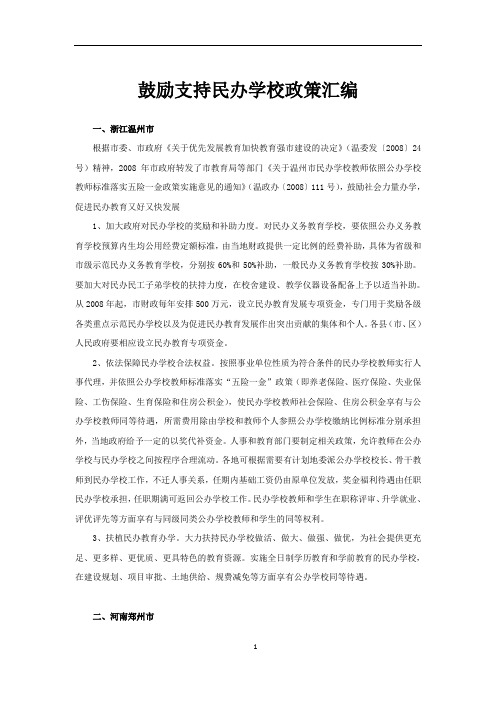
鼓励支持民办学校政策汇编一、浙江温州市根据市委、市政府《关于优先发展教育加快教育强市建设的决定》(温委发〔2008〕24号)精神,2008年市政府转发了市教育局等部门《关于温州市民办学校教师依照公办学校教师标准落实五险一金政策实施意见的通知》(温政办〔2008〕111号),鼓励社会力量办学,促进民办教育又好又快发展1、加大政府对民办学校的奖励和补助力度。
对民办义务教育学校,要依照公办义务教育学校预算内生均公用经费定额标准,由当地财政提供一定比例的经费补助,具体为省级和市级示范民办义务教育学校,分别按60%和50%补助,一般民办义务教育学校按30%补助。
要加大对民办民工子弟学校的扶持力度,在校舍建设、教学仪器设备配备上予以适当补助。
从2008年起,市财政每年安排500万元,设立民办教育发展专项资金,专门用于奖励各级各类重点示范民办学校以及为促进民办教育发展作出突出贡献的集体和个人。
各县(市、区)人民政府要相应设立民办教育专项资金。
2、依法保障民办学校合法权益。
按照事业单位性质为符合条件的民办学校教师实行人事代理,并依照公办学校教师标准落实“五险一金”政策(即养老保险、医疗保险、失业保险、工伤保险、生育保险和住房公积金),使民办学校教师社会保险、住房公积金享有与公办学校教师同等待遇,所需费用除由学校和教师个人参照公办学校缴纳比例标准分别承担外,当地政府给予一定的以奖代补资金。
人事和教育部门要制定相关政策,允许教师在公办学校与民办学校之间按程序合理流动。
各地可根据需要有计划地委派公办学校校长、骨干教师到民办学校工作,不迁人事关系,任期内基础工资仍由原单位发放,奖金福利待遇由任职民办学校承担,任职期满可返回公办学校工作。
民办学校教师和学生在职称评审、升学就业、评优评先等方面享有与同级同类公办学校教师和学生的同等权利。
3、扶植民办教育办学。
大力扶持民办学校做活、做大、做强、做优,为社会提供更充足、更多样、更优质、更具特色的教育资源。
黑龙江省人民政府关于促进民办教育发展的若干意见-黑政发[2005]25号
![黑龙江省人民政府关于促进民办教育发展的若干意见-黑政发[2005]25号](https://img.taocdn.com/s3/m/4f43db12ba68a98271fe910ef12d2af90242a889.png)
黑龙江省人民政府关于促进民办教育发展的若干意见正文:---------------------------------------------------------------------------------------------------------------------------------------------------- 黑龙江省人民政府关于促进民办教育发展的若干意见(黑政发[2005]25号)大兴安岭地区行政公署,各市、县人民政府,省政府各直属单位:为进一步完善办学体制、激活办学机制、调动社会力量办学的积极性,根据《中华人民共和国民办教育促进法》、《中华人民共和国民办教育促进法实施条例》、《中共黑龙江省委、黑龙江省人民政府关于进一步加快民营经济发展的若干意见》》(黑发〔2004〕6号)等一系列法律、法规和政策精神,结合我省实际,现就促进民办教育发展提出如下意见。
一、民办教育事业属于公益事业,是社会主义教育事业的重要组成部分。
各级政府要切实加强对民办教育工作的领导,将民办教育事业纳入国民经济和社会发展规划,保证民办学校与公办学校具有同等的法律地位,保障民办学校的办学自主权。
二、县级以上人民政府教育行政部门主管本行政区域内的民办教育工作。
县级以上人民政府劳动和社会保障行政部门及其他有关部门在各自的职责范围内,分别负责有关的民办教育工作。
审批机关应建立健全统筹管理、分工负责的管理体制和运行机制,加强对民办学校的日常监督,组织或委托社会中介组织对民办学校的办学水平和教学质量进行评估。
三、设立民办学校应当符合当地教育发展的需求,具备教育法和其他有关法律、法规规定的条件。
民办学校的设置标准,参照同级同类公办学校的设置标准执行。
本省审批权限范围内民办学校的具体设置标准,由省教育行政部门依据法律、法规和国家有关规定制定。
省劳动和社会保障行政部门负责制定职业资格培训、职业技能培训机构的设立标准。
国务院关于鼓励社会力量兴办教育促进民办教育健康发展的若干意见

国务院关于鼓励社会力量兴办教育促进民办教育健康发展的若干意见文章属性•【制定机关】国务院•【公布日期】2016.12.29•【文号】国发〔2016〕81号•【施行日期】2016.12.29•【效力等级】国务院规范性文件•【时效性】现行有效•【主题分类】民办教育正文国务院关于鼓励社会力量兴办教育促进民办教育健康发展的若干意见国发〔2016〕81号各省、自治区、直辖市人民政府,国务院各部委、各直属机构:社会力量兴办教育是指各种社会力量以捐赠、出资、投资、合作等方式举办或者参与举办法律法规允许的各级各类学校和其他教育机构。
改革开放以来,作为社会力量兴办教育主要形式的民办教育不断发展壮大,形成了从学前教育到高等教育、从学历教育到非学历教育,层次类型多样、充满生机活力的发展局面,有效增加了教育服务供给,为推动教育现代化、促进经济社会发展作出了积极贡献,已经成为社会主义教育事业的重要组成部分。
同时,民办教育也面临许多制约发展的问题和困难。
为鼓励社会力量兴办教育,促进民办教育健康发展,现提出如下意见。
一、总体要求(一)指导思想。
全面贯彻落实党的十八大和十八届三中、四中、五中、六中全会精神,深入贯彻习近平总书记系列重要讲话精神,按照“四个全面”战略布局和党中央、国务院决策部署,牢固树立并切实贯彻创新、协调、绿色、开放、共享五大发展理念,全面贯彻党的教育方针,坚持社会主义办学方向,坚持立德树人,培育和践行社会主义核心价值观。
以实行分类管理为突破口,创新体制机制,完善扶持政策,加强规范管理,提高办学质量,进一步调动社会力量兴办教育的积极性,促进民办教育持续健康发展,培养德智体美全面发展的社会主义建设者和接班人。
(二)基本原则。
育人为本,德育为先。
把立德树人作为根本任务,把理想信念教育摆在首要位置,形成全员、全过程、全方位育人的工作格局,提高学生服务国家服务人民的社会责任感、勇于探索的创新精神和善于解决问题的实践能力。
民办教育法规用地优惠政策

民办教育法规用地优惠政策Company Document number:WUUT-WUUY-WBBGB-BWYTT-1982GT中华人民共和国民办教育促进法第三条民办教育事业属于公益性事业,是社会主义教育事业的组成部分。
国家对民办教育实行积极鼓励、大力支持、正确引导、依法管理的方针。
各级人民政府应当将民办教育事业纳入国民经济和社会发展规划。
第五条民办学校与公办学校具有同等的法律地位,国家保障民办学校的办学自主权。
国家保障民办学校举办者、校长、教职工和受教育者的合法权益。
第六条国家鼓励捐资办学。
国家对为发展民办教育事业做出突出贡献的组织和个人,给予奖励和表彰。
第四十四条县级以上各级人民政府可以设立专项资金,用于资助民办学校的发展,奖励和表彰有突出贡献的集体和个人。
第四十五条县级以上各级人民政府可以采取经费资助,出租、转让闲置的国有资产等措施对民办学校予以扶持。
第四十六条民办学校享受国家规定的税收优惠政策。
第五十条新建、扩建民办学校,人民政府应当按照公益事业用地及建设的有关规定给予优惠。
教育用地不得用于其他用途。
第五十二条国家采取措施,支持和鼓励社会组织和个人到少数民族地区、边远贫困地区举办民办学校,发展教育事业。
中华人民共和国民办教育促进法实施条例第六章扶持与奖励第三十八条捐资举办的民办学校和出资人不要求取得合理回报的民办学校,依法享受与公办学校同等的税收及其他优惠政策。
四川省《中华人民共和国民办教育促进法》实施办法第四条民办学校与公办学校具有同等的法律地位。
民办学校的办学自主权及其他合法权益受法律保障。
第二十六条县级以上地方各级人民政府应当设立专项资金,用于资助民办教育事业的发展,奖励和表彰有突出贡献的集体和个人。
第二十七条国有企事业单位可以将闲置的房产和设备设施等资源以国有资产投入形式与民办学校合作办学或依法优先出租、转让给民办学校使用。
第二十八条捐资举办的民办学校和出资人不要求取得合理回报的民办学校,依法享受与公办学校同等的税收以及其他优惠政策。
关于规范民办学校办学行为促进民办教育健康发展专项治理行动实施方案(最新)

关于规范民办学校办学行为促进民办教育健康发展专项治理行动实施方案一、法律法规政策依据(一)《中华人民共和国教育法》(二)《中华人民共和国义务教育法》(三)《中华人民共和国职业教育法》(四)《中华人民共和国民办教育促进法》(五)《中华人民共和国消防法》(六)《中华人民共和国广告法》(七)《中华人民共和国行政许可法》(八)《中华人民共和国民办教育促进法实施条例》(九)《国务院关于鼓励社会力量兴办教育促进民办教育健康发展的若干意见》(国发〔X〕8号)(十)《民办非企业单位登记管理暂行条例》(十一)教育部等七部委《关于X年规范教育收费进一步治理教育乱收费工作的实施意见》(教监〔X〕5号)(十二)教育部《中等职业学校设置标准》(十三)《教育部办公厅关于做好xx年普通中小学招生入学工作的通知》(教基厅〔xx〕5号)(十四)《教育部办公厅等四部门关于切实减轻中小学生课外负担开展校外培训机构专项治理行动的通知》(教基厅〔xx〕3号)(十五)《教育部办公厅关于加快推进校外培训机构专项治理工作的通知》(教基厅函〔xx〕13号)(十六)国家课程方案、课程标准(十七)《X林省义务教育学校办学标准》(十八)X林省教育厅X林省人力资源与社会保障厅《关于加快推进职业教育布局结构调整的通知》(X教联字〔X〕15号)(十九)xx市教育局关于印发《xx市教育局关于进一步加强民办学校管理促进民办教育健康发展的若干举措》的通知(长教民字〔X〕4号)(二十)《食品安全法》二、组织领导和职责分工(一)区政府成立由分管副区长任组长,区委政法委综治办、区教育局、发改局、民政局、人社局、卫计局、工商分局、公安分局、消防大队、食药监分局、英俊镇政府及各街道办事处等单位相关负责人为成员的专项治理行动领导小组,负责专项治理行动的指导和监督工作。
教育局负责牵头组织和协调工作,各成员单位要安排专人负责此项工作。
(二)区教育局成立由局长为组长,其他副局长为副组长,学前教育科(民办教育管理办公室)、基础教育科、德体卫艺科、安全科、督导室、人事科及纪检办公室负责人、中小学校长为成员的领导小组。
2024年民办公助实施方案

2024年民办公助实施方案发布于2024年,其目的是为了加强民办教育机构的办学质量和公益性,促进教育公平与多元化发展。
以下是针对该实施方案的详细解析。
一、实施背景和目标在2024年之前,我国的教育体制主要由公办学校组成,民办教育机构发展相对滞后,教育资源分配不均衡,不利于教育公平。
为了解决这个问题,2024年的实施方案旨在加强民办教育机构的办学质量和公益性,推动教育多元化,提高教育发展的整体水平。
二、实施内容和措施1.完善民办公助政策体系:制定了《民办教育促进法》和《民办学校管理办法》,明确了民办教育机构的法律地位和管理要求。
2.支持民办教育机构:加大对民办教育机构的财政支持力度,设立专项资金,用于购买教育资源、改善办学条件等方面。
3.扶持优质民办教育机构:通过评选、奖励等方式,鼓励和扶持优质的民办教育机构,提高其办学质量和师资水平。
4.民办教育机构的公益性要求:要求民办教育机构具备一定的公益性质,不得以牟利为目的,要为社会提供普惠教育服务。
5.加强民办教育机构的管理和监督:设立专门的监督机构,加强对民办教育机构的管理和监督,确保其按照相关规定进行办学。
三、实施效果和意义实施2024年民办公助实施方案后1.提高了民办教育机构的办学质量:通过政策支持和监管,促使民办教育机构提高办学水平,提供更优质的教育服务。
2.促进了教育公平与多元化发展:增加了民办教育机构的数量和质量,提供了更多的教育选择,促进了教育公平和多元化发展。
3.增加了教育资源的供给:政府通过资金支持和政策扶持,增加了民办教育机构的数量和规模,有效增加了教育资源的供给。
4.推动了教育发展的整体水平:民办教育机构的发展有利于推动整体教育水平的提高,促进了教育和创新。
总结起来,2024年民办公助实施方案的出台是为了加强民办教育机构的办学质量和公益性,促进教育公平与多元化发展。
通过政策支持、财政扶持和管理监督等措施,取得了一定的成效,促进了民办教育机构的发展,提高了教育的整体水平。
鼓励支持民办本科高校发展

鼓励支持民办本科高校发展作者:张少龙彭华来源:《中国民商》2024年第04期党的二十大报告指出,我们要坚持教育优先发展战略,致力于打造人民满意的教育体系,并引导和规范民办教育发展。
习近平总书记在中央政治局第五次集体学习时强调,高等教育是建设教育强国的关键。
2024年全国教育工作会议上,教育部部长怀进鹏明确指出,要“充分发挥高等教育的龙头作用,夯实基础教育的基点,并发挥职业教育在促进共同富裕中的重要作用”。
我国民办高等教育在高等教育大众化进程中迅速发展,有效满足了人民群众对多样化教育的需求,并在减轻公共教育财政压力方面发挥了积极作用。
截至2022年,民办普通本科院校数量达到390所[高等教育学校包括普通本科院校、本科层次职业学校、高职(专科)学校、成人高等学校四种类别],占全国总量的31.48%,在校学生数占全国普通本科毕业生的26.09%,已成为中国高等教育体系的重要组成部分。
2022年我国高等教育毛入学率59.6%,已经进入了普及化发展的初级阶段,民办高等教育是推进高等教育普及化、拓宽高等教育市场的关键力量。
相比于日本、韩国等国家60%以上的私立高校学生比例,我国民办高等教育在普及化阶段的发展潜力巨大。
引导并规范民办普通本科高校的发展,不仅有助于支撑我国的科技强国、人才强国的建设,形成推动高质量发展的倍增效应,民办高等教育机制灵活的优势也将服务于广大人民群众适应数智时代,实现共同富裕。
一、民办本科高校发展面临的主要问题民办本科高校促进了我国高等教育的多元化发展,为国内居民提供了更多教育机会。
其在培养应用型人才、推动教育创新、加强国际交流合作方面发挥了重要作用。
随着我国经济社会的发展,民办高等教育的发展背景发生了显著的变化。
国内产业结构的升级对高素质人才的需求增加,而低生育率的趋势使民办高校面临着更加激烈的生源竞争。
此外,同质化的办学模式减弱了高校对行业和区域经济发展的积极影响,并可能降低人才培养质量。
中华人民共和国民办教育促进法实施条例(2021年修订)

中华人民共和国民办教育促进法实施条例(2021年修订)文章属性•【制定机关】国务院•【公布日期】2021.04.07•【文号】中华人民共和国国务院令第741号•【施行日期】2021.09.01•【效力等级】行政法规•【时效性】现行有效•【主题分类】民办教育正文中华人民共和国国务院令第741号现公布修订后的《中华人民共和国民办教育促进法实施条例》,自2021年9月1日起施行。
总理李克强2021年4月7日中华人民共和国民办教育促进法实施条例(2004年3月5日中华人民共和国国务院令第399号公布2021年4月7日中华人民共和国国务院令第741号修订)第一章总则第一条根据《中华人民共和国民办教育促进法》(以下简称民办教育促进法),制定本条例。
第二条国家机构以外的社会组织或者个人可以利用非国家财政性经费举办各级各类民办学校;但是,不得举办实施军事、警察、政治等特殊性质教育的民办学校。
民办教育促进法和本条例所称国家财政性经费,是指财政拨款、依法取得并应当上缴国库或者财政专户的财政性资金。
第三条各级人民政府应当依法支持和规范社会力量举办民办教育,保障民办学校依法办学、自主管理,鼓励、引导民办学校提高质量、办出特色,满足多样化教育需求。
对于举办民办学校表现突出或者为发展民办教育事业做出突出贡献的社会组织或者个人,按照国家有关规定给予奖励和表彰。
第四条民办学校应当坚持中国共产党的领导,坚持社会主义办学方向,坚持教育公益性,对受教育者加强社会主义核心价值观教育,落实立德树人根本任务。
民办学校中的中国共产党基层组织贯彻党的方针政策,依照法律、行政法规和国家有关规定参与学校重大决策并实施监督。
第二章民办学校的设立第五条国家机构以外的社会组织或者个人可以单独或者联合举办民办学校。
联合举办民办学校的,应当签订联合办学协议,明确合作方式、各方权利义务和争议解决方式等。
国家鼓励以捐资、设立基金会等方式依法举办民办学校。
以捐资等方式举办民办学校,无举办者的,其办学过程中的举办者权责由发起人履行。
潍坊市人民政府关于进一步支持规范民办教育发展的意见
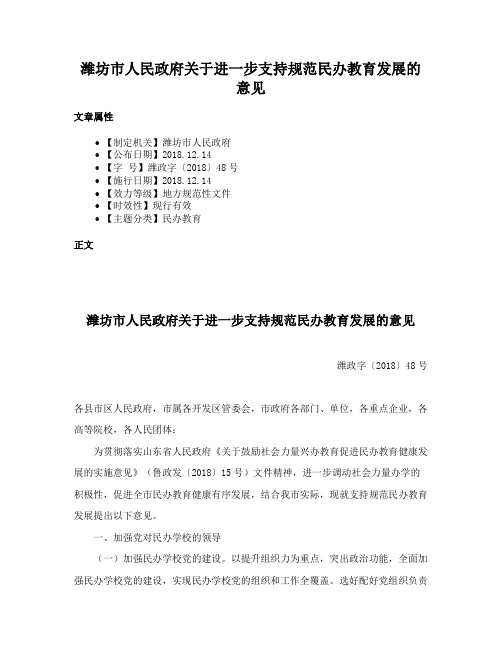
潍坊市人民政府关于进一步支持规范民办教育发展的意见文章属性•【制定机关】潍坊市人民政府•【公布日期】2018.12.14•【字号】潍政字〔2018〕48号•【施行日期】2018.12.14•【效力等级】地方规范性文件•【时效性】现行有效•【主题分类】民办教育正文潍坊市人民政府关于进一步支持规范民办教育发展的意见潍政字〔2018〕48号各县市区人民政府,市属各开发区管委会,市政府各部门、单位,各重点企业,各高等院校,各人民团体:为贯彻落实山东省人民政府《关于鼓励社会力量兴办教育促进民办教育健康发展的实施意见》(鲁政发〔2018〕15号)文件精神,进一步调动社会力量办学的积极性,促进全市民办教育健康有序发展,结合我市实际,现就支持规范民办教育发展提出以下意见。
一、加强党对民办学校的领导(一)加强民办学校党的建设。
以提升组织力为重点,突出政治功能,全面加强民办学校党的建设,实现民办学校党的组织和工作全覆盖。
选好配好党组织负责人。
扎实做好民办高校党委书记选派和管理工作。
民办学校党组织要发挥政治核心作用,牢牢把握社会主义办学方向。
从2018年起,所在党组织将民办学校党委(总支、支部)书记纳入抓基层党建述职评议考核范围。
要把民办学校党组织建设、党对民办学校的领导作为民办学校年度检查的重要内容。
(二)加强和改进民办学校思想政治教育工作。
把思想政治教育工作纳入民办学校发展规划。
切实加强思想政治教育课程、教材、教师队伍建设,把社会主义核心价值观融入教育教学全过程、教书育人各环节,不断增强广大师生“四个自信”。
提高思想政治教育的针对性、实效性和吸引力、感染力,引导学生树立正确的世界观、人生观、价值观。
大力开展社会实践和志愿服务,积极开展心理健康教育。
发挥好“灯塔-党建在线”综合管理服务平台作用,构建多层次、多渠道的党员经常性学习教育体系。
二、稳步推进民办学校分类管理(三)建立分类管理制度。
对民办学校(含其他民办教育机构)实行非营利性和营利性分类管理。
- 1、下载文档前请自行甄别文档内容的完整性,平台不提供额外的编辑、内容补充、找答案等附加服务。
- 2、"仅部分预览"的文档,不可在线预览部分如存在完整性等问题,可反馈申请退款(可完整预览的文档不适用该条件!)。
- 3、如文档侵犯您的权益,请联系客服反馈,我们会尽快为您处理(人工客服工作时间:9:00-18:30)。
鼓励支持民办学校政策汇编一、浙江温州市〕24根据市委、市政府《关于优先发展教育加快教育强市建设的决定》(温委发〔2008年市政府转发了市教育局等部门《关于温州市民办学校教师依照公办学校号)精神,2008号),鼓励社会力量办〕111教师标准落实五险一金政策实施意见的通知》(温政办〔2008学,促进民办教育又好又快发展、加大政府对民办学校的奖励和补助力度。
对民办义务教育学校,要依照公办义务教 1育学校预算内生均公用经费定额标准,由当地财政提供一定比例的经费补助,具体为省级补助。
30%60%和50%补助,一般民办义务教育学校按和市级示范民办义务教育学校,分别按要加大对民办民工子弟学校的扶持力度,在校舍建设、教学仪器设备配备上予以适当补助。
万元,设立民办教育发展专项资金,专门用于奖励各级2008年起,市财政每年安排500从各类重点示范民办学校以及为促进民办教育发展作出突出贡献的集体和个人。
各县(市、区)人民政府要相应设立民办教育专项资金。
、依法保障民办学校合法权益。
按照事业单位性质为符合条件的民办学校教师实行人2事代理,并依照公办学校教师标准落实“五险一金”政策(即养老保险、医疗保险、失业,使民办学校教师社会保险、住房公积金享有与保险、工伤保险、生育保险和住房公积金)公办学校教师同等待遇,所需费用除由学校和教师个人参照公办学校缴纳比例标准分别承担外,当地政府给予一定的以奖代补资金。
人事和教育部门要制定相关政策,允许教师在公办学校与民办学校之间按程序合理流动。
各地可根据需要有计划地委派公办学校校长、骨干教师到民办学校工作,不迁人事关系,任期内基础工资仍由原单位发放,奖金福利待遇由任职民办学校承担,任职期满可返回公办学校工作。
民办学校教师和学生在职称评审、升学就业、评优评先等方面享有与同级同类公办学校教师和学生的同等权利。
、扶植民办教育办学。
大力扶持民办学校做活、做大、做强、做优,为社会提供更充 3足、更多样、更优质、更具特色的教育资源。
实施全日制学历教育和学前教育的民办学校,在建设规划、项目审批、土地供给、规费减免等方面享有公办学校同等待遇。
二、河南郑州市1.年,河南二七区政府出台了《关于规范民办教育管理促进民办教育发展的意见》,2007明确指示:1、政府委托民办学校承担部分义务教育任务,要根据受委托民办学校接收义务教育学生的数量和当地公办中小学的生均教育经费标准,拨给相应的教育经费。
、民办学校所需办学用地纳入土地利用和城镇建设规划,与公办学校同等对待,统筹2安排,保证民办学校发展的土地需要。
三、深圳市,提出:深圳市市政府出台《关于促进我市民办教育发展重点建议办理情况的报告》、2010年我市进一步加大了对民办教育的扶持力度,每年财政部门将扶持民 1办教育的专项经费纳入财政年度教育经费预算。
每年城市教育费附加的15%用于支持民办教育发展。
市级财政另安排3000万元资助55所近年来优质规范办学的民办中小学及其省级以上教育科研课题。
2、补贴义务教育阶段民办学校,进一步完善对民办教育的财政扶持政策。
市政府》,将研究制会同市财政委草拟《深圳市民办教育发展专项资金管理办法(征求意见稿)定《深圳市义务教育阶段民办学校补贴办法》,对委托招收义务教育阶段本市户籍学生以及符合在我市接受免费义务教育的非户籍学生的民办学校,根据在校生人数和办学条件、办学水平,按照同级同类公办学校生均拨款标准的一定比例给予补贴,补贴标准逐步向公办学校看齐。
四、上海市年上海市基础教育工上海市教委发布《2009年上海市教育委员会工作要点》和《2009作要点》,将着力调配和增加教育资源,对义务教育阶段民办教育实行生均公用经费补贴和免除学生杂费,减免民办中小学校舍设施设备租赁费。
上海浦东新区鼓励开办民办学校,浦东的民办学校获得了许多政策上的优惠,其中包括在土地使用费上给予优惠,实行税收返还政策;对于依法办学、教育质量高的民办学校还给予专项奖励;对义务教育阶段的民办学校拨给一定的生均公用经费等。
五、广西南宁市制定《南宁市民办学校接受政府委托承担义务教育任务管理暂行办法》,规定:2.1、政府按照民办学校接受地段生的人数,给予学校足额核定的教职工编制;2、财政部门按照义务教育地段生人数所需公费和教职工编制等成本,按月拨给民办学校教育经费。
民办学校公聘教师将享有与南宁市公办教师同等的工资福利和退休费待遇。
3、在校舍建设上,民办校校舍建设用地纳入当地城乡建设规划,按照公益性事业用地办理,并减免相关规费。
4、义务教育阶段实施经费保障机制,对于承担初中和小学教育任务的民办学校可以获得教育经费补助;5、教师支持,鼓励公办学校教师到民办学校任教,对于这部分教师,其人事档案由当地人事部门所属的人才交流中心托管,工龄可连续计算。
、其他优惠政策,民办校毕业的学生在升学就业、社会资助、评先选优等方面享有同6等权利;学生的资助政策和标准与公办学校一视同仁等。
六、浙江绍兴,积极营造公平绍兴县人民政府于下发《关于进一步鼓励和促进民办教育发展的意见》意见积极鼓励公办学校与民办学校开展合作办学、办班,促环境,把民办教育做大扶强。
进共同发展。
根据意见规定,凡是在绍兴县创办的民办学校,可以在师资、经费、招生等大优惠政策:7方面享受到1、鼓励民办学校招聘本县在职公办教师,且数量不受限制。
被聘教师其公办教师性质不变,聘期结束后,经申请同意,可随带聘任期间的养老保险和医疗保险基金回原单位工作;2、根据民办学校办学的要求,选派校长协助民办学校进行教育业务管理,选派一定数量的公办教师协助开展教育、教学及安全管理工作;的比例面向县外招聘高层次教、民办学校每年可按不超过学校在职在编教师总数2%340周岁以下且身体健育人才(具有中学高级及以上职称或硕士研究生及以上学历,年龄在康的在职公办教师),经县人事、教育部门同意,可给予其本县公办教师的编制与身份,并将其关系放于县教育部门下属的公办学校内。
、按义务教育阶段本县籍在校生和高中阶段在校并轨生人数,根据全县平均师生比核4的比例给予民办学、80%、60%30%定教师编制数,由县财政按预算定额规定,每年分别以校教师人员经费补助;5、县财政按公办学校生均公用经费标准给予适当的经费补助;3.6、将民办学校的建设用地统一纳入当地城乡建设规划,学校在征用土地和减免建设配套等有关规费方面,享受与公办学校同等的优惠政策;7、民办学校可不受地域、计划限制实行单独优先自主招生,从严控制城区公办学校的班级学额与外县籍借读生招收,并给予招收高中学生的民办学校一定的并轨生指标,确保绍兴县教育局)民办学校的招生数。
(七、湖南省规定:《湖南省人民政府关于促进民办教育发展的决定》、鼓励多种形式发展民办教育。
各级人民政府和有关部门把民办教育纳入国民经济和1社会发展规划,统筹安排,合理布局。
积极鼓励企事业单位、社会团体、其它社会组织及公民个人利用非财政性资金依法独资、合资、合作办学。
鼓励境外教育机构按照有关法律法规参与民办教育活动或开展合作办学。
、引导民办教育努力扩充优质教育资源,重点扶持发展一批民办学校成为全省示范性2学校(幼儿园),引导形成一批规模适度、质量优良、特色鲜明、社会反响良好的优秀民办学校,以满足社会对优质教育资源的多元化需求。
3、民办学校用地和建设等方面享受公办学校同等优惠政策。
新建、扩建民办学校应按照公益事业用地的有关规定给予优惠。
以民办学校名义取得的教育用地改作其他用地的,土地管理部门有权收回。
民办学校的校舍建设享受同级同类公办学校的基本建设优惠政策。
民办学校在水、电、气等供给方面享受同级同类公办学校同等的政策待遇。
、加大对民办教育的公共财政和金融支持力度。
各级政府设立民办教育发展专项资金,4年起,省财政在教育事业经费之外,每年安排民办教育发2008引导民办学校健康发展。
从万元。
民办教育展专项资金应随同级财政收入的增长而逐年增加。
民办教展专项资金500育发展专项资金由财政部门负责管理,教育部门报同级财政部门批准后使用。
鼓励社会向民办学校捐资,或者设立专项奖励与发展资金支持民办教育发展。
、切实保障民办学校教师的合法权益。
允许教师在公办学校与民办学校之间合理流动,5公办学校教师到民办学校工作的,工龄连续计算,民办学校教师如果被国家机关和事业单位录(聘)用,在民办学校从业的年限计算为连续工龄。
民办学校教师在教师资格认定、业务进修、职称评定、表彰奖励、科研立项、职业技能鉴定等方面均与公办学校教师同等对待,统一管理。
6、统筹民办学校与公办学校的招生管理。
民办高中教育阶段的民办学校招生纳入当地4.招生计划,并与同类型、同层次公办学校安排在同一批次招生。
学校所在地政府委托承担义务教育的民办学校,其招生纳入当地招生范围。
7、民办学校学生与公办学校学生依法具有同等的法律地位。
民办学校学生在学籍管理、表彰奖励、升学、毕业生就业等方面享有同级同类公办学校学生的同等权利。
八、云南省》《教育中长期改革发展规划纲要(2010-2020)、促进民办教育发展。
1民办教育纳入政府统一统筹、规划和管理。
设立专门的民办教育管理机构,建立一批示范性民办教育机构。
依法落实民办学校、学生、教师与公办学校、学生、教师平等的法律地位,保障民办学校办学自主权。
清理并纠正对民办学校的各类歧视政策和做法,积极探索和制定落实促进民办教育发展的优惠政策。
明确和落实民办学校“民办事业单位”法律地位和属性。
建立和完善民办学校教师社会保险制度。
建立公办学校教师到民办学校支教任教制度。
建立健全公共财政对民办教育的扶持政策。
政府设立专项资金,用于资助民办学校发展。
建立民办教育发展基金,给予贫困地区、教育资源稀缺地区的民办学校及义务教育阶段民办学校有力的政策支持和经费奖励。
支持民办学校创新体制机制和育人模式,提高民办学校办学质量。
表彰和奖励发展民办教育的组织、学校和个人。
、深化办学体制改革试点。
积极鼓励行业、企业等社会力量参与公办学校办学,探索2公办学校联合办学、中外合作办学、委托管理等改革试验;探索公办、民办教育的衔接机制,逐步建立不同办学体制学校之间教师、学生等人员和资源合理流动的渠道。
支持民办学校创新办学体制,建立政府指导、企事业单位等积极参与的民办学校投融资机制和管理模式。
九、昆明市《突破性发展民办教育整体推进工作意见》年起,根据“十20101、加大财政投入力度,拓宽资金扶持范围。
各级财政部门要从二五”规划和年度计划,统筹预算专款、本地教育费附加和接受捐赠,设立本级民办教育发展专项资会,进一步完善民办教育奖励机制和建立民办学校办学经费补助机制,将专项资金用于支持民办学校的规模发展、示范性民办学校建设、表彰奖励有突出贡献的集体和个人、民办学校办学经费补助以及新建和扩建项目贷款贴息等。
